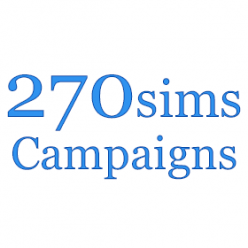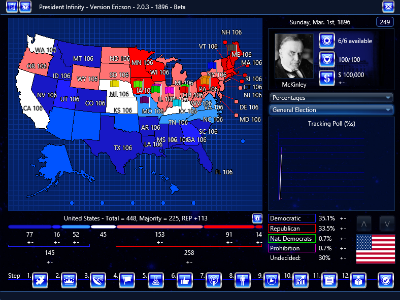*This election was greatly updated by the Historical Scenario Commission on August 24, 2017. It can be downloaded here: United States – 1896 v. 2.0
The 1896 election focused primarily on the Panic of 1893 financial crises. Unemployment was high and the economy was shaky. The incumbent Bourbon Democrat (Fiscally conservative, pro-Gold Standard) president, Grover Cleveland, decided not to run for a 3rd term, partially because he was becoming increasingly unpopular in the West and much of the South. The argument for improving the economic welfare of the people centered on silver and gold. Bourbon Democrats and mainstream Republicans, both conservatives, wanted a Gold Standard. Moderate Republicans and mainstream Democrats wanted both gold and silver to back currency (bimetallism). Populist Democrats and Republicans advocated Free Silver, as the believed silver, rather than gold, would increase their standard of living. All other issues were of secondary importance.
For Republicans, the mainstream element flocked to the popular and respected William McKinley of Ohio. However, he faced some competition from powerful Speaker of the House Thomas Bracket Reed, Pennsylvania party boss Matthew Quay, former Vice President Levi P. Morton and respected Senator William B. Allison. They embraced the Gold Standard. As such, many Silver Republicans voted Democrat.
The Democrats, rebuking President Cleveland, dropped the Gold Standard from their platform and embraced bimetallism. As such, all the nominees were pro-silver candidates. Richard “Silver Dick” Bland had a long history of promoting silver and was the favorite. However, 36-year-old William Jennings Bryan was the rising star of the party, as he condemned the Gold Standard by saying, “you shall not crucify mankind upon a cross of gold.” Other leading Silverites competed. Overall, a fairly competitive convention. Gold Democrats either voted for McKinley or voted for the 3rd Party National Democrats.
This election has two third parties, both which were primarily single issue. The National Democrats tried to split the Democratic Party to prevent the Democratic silver platform. Their ticket included to ancient politicians: John Palmer and former Confederate General Simon Boliver Buckner, both in their 70s. The Prohibition Party aimed at passing prohibition laws.
The election allows for several what-ifs:
- What if former Republican president Benjamin Harrison ran for a non-consecutive second term? He left office unpopular, but with silver back on the table, could a silver-tolerant Republican with presidential experience get back in the office?
- As usual, Robert Todd Lincoln, the son of our great president, was pushed to run. What if he had?
- Henry Cabot Lodge of Massachusetts was the leader American Imperialist in the Senate, advocating expanding America’s military might and possessions. He was a mentor for Teddy Roosevelt and other politicians greatly in favor for war with Spain and the acquisition of territories outside the United States. What if he had run?
- What if Grover Cleveland ran for a 3rd term? He would have received every Gold Democrat vote, but could he convince Silver Democrats that voting for him was the best bet to beat Republicans?
- What if Grover Cleveland had accepted the National Democrat nomination? Would a sitting president rebuke his own silver-happy party and run as a 3rd party for the proponents of gold? Can Cleveland do more than just split the Democratic vote?
Feedback is desired to improve the scenario.


Yes!!! So hyped!!
Since you are about to do 1892, please please please put my home state (NC) hero of L.L. Polk as a populist party choice. He was going to be the nominee until a sudden death
@Nick
I’ll add LL Polk. Thanks.
@Everyone else
I realized that I didn’t add the logo for the two third parties. These will be added in the update. I’ve decided not to update the scenarios until I’ve gone all the way back to the first election. I’ll then update starting from the first election to the present. You can help by finding any typos or anything else that could have been missed. I am aware that the population #s and the delegate numbers need to be update. These will be fixed in the updates, but they don’t pose a problem in playing these first releases of the scenarios. In the updates, I will also add more candidates, primarily favorite son candidates. I’ll add events whenever an event editor is added or if someone will code the events for me.
Thanks for all your feedback everyone!
You’re doing a great job. I love these
National Democratic – Edward S. Bragg, Grover Cleveland
Prohibition – Joshua Levering
Socialist Labor – Charles Matchett
National Prohibition – Charles Bentley
Silver Republican – Henry M. Teller
For the Republicans, H. Clay Evans seemed to have a strong second place showing as a potential VP candidate.
On the Democrats side of things, John R. McLean, Joseph C. Sibley and Richard P. Bland all lead the balloting for VP at one point before eventual nominee Arthur Sewall was chosen.